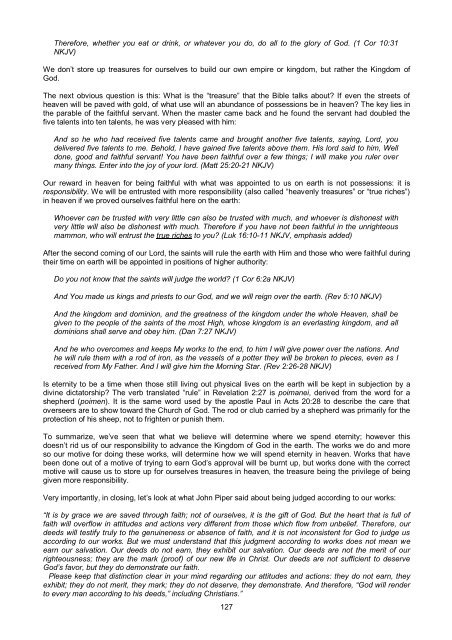Grace, the Forbidden Gospel - Online Christian Library
Grace, the Forbidden Gospel - Online Christian Library
Grace, the Forbidden Gospel - Online Christian Library
You also want an ePaper? Increase the reach of your titles
YUMPU automatically turns print PDFs into web optimized ePapers that Google loves.
Therefore, whe<strong>the</strong>r you eat or drink, or whatever you do, do all to <strong>the</strong> glory of God. (1 Cor 10:31<br />
NKJV)<br />
We don’t store up treasures for ourselves to build our own empire or kingdom, but ra<strong>the</strong>r <strong>the</strong> Kingdom of<br />
God.<br />
The next obvious question is this: What is <strong>the</strong> “treasure” that <strong>the</strong> Bible talks about? If even <strong>the</strong> streets of<br />
heaven will be paved with gold, of what use will an abundance of possessions be in heaven? The key lies in<br />
<strong>the</strong> parable of <strong>the</strong> faithful servant. When <strong>the</strong> master came back and he found <strong>the</strong> servant had doubled <strong>the</strong><br />
five talents into ten talents, he was very pleased with him:<br />
And so he who had received five talents came and brought ano<strong>the</strong>r five talents, saying, Lord, you<br />
delivered five talents to me. Behold, I have gained five talents above <strong>the</strong>m. His lord said to him, Well<br />
done, good and faithful servant! You have been faithful over a few things; I will make you ruler over<br />
many things. Enter into <strong>the</strong> joy of your lord. (Matt 25:20-21 NKJV)<br />
Our reward in heaven for being faithful with what was appointed to us on earth is not possessions: it is<br />
responsibility. We will be entrusted with more responsibility (also called “heavenly treasures” or “true riches”)<br />
in heaven if we proved ourselves faithful here on <strong>the</strong> earth:<br />
Whoever can be trusted with very little can also be trusted with much, and whoever is dishonest with<br />
very little will also be dishonest with much. Therefore if you have not been faithful in <strong>the</strong> unrighteous<br />
mammon, who will entrust <strong>the</strong> true riches to you? (Luk 16:10-11 NKJV, emphasis added)<br />
After <strong>the</strong> second coming of our Lord, <strong>the</strong> saints will rule <strong>the</strong> earth with Him and those who were faithful during<br />
<strong>the</strong>ir time on earth will be appointed in positions of higher authority:<br />
Do you not know that <strong>the</strong> saints will judge <strong>the</strong> world? (1 Cor 6:2a NKJV)<br />
And You made us kings and priests to our God, and we will reign over <strong>the</strong> earth. (Rev 5:10 NKJV)<br />
And <strong>the</strong> kingdom and dominion, and <strong>the</strong> greatness of <strong>the</strong> kingdom under <strong>the</strong> whole Heaven, shall be<br />
given to <strong>the</strong> people of <strong>the</strong> saints of <strong>the</strong> most High, whose kingdom is an everlasting kingdom, and all<br />
dominions shall serve and obey him. (Dan 7:27 NKJV)<br />
And he who overcomes and keeps My works to <strong>the</strong> end, to him I will give power over <strong>the</strong> nations. And<br />
he will rule <strong>the</strong>m with a rod of iron, as <strong>the</strong> vessels of a potter <strong>the</strong>y will be broken to pieces, even as I<br />
received from My Fa<strong>the</strong>r. And I will give him <strong>the</strong> Morning Star. (Rev 2:26-28 NKJV)<br />
Is eternity to be a time when those still living out physical lives on <strong>the</strong> earth will be kept in subjection by a<br />
divine dictatorship? The verb translated “rule” in Revelation 2:27 is poimanei, derived from <strong>the</strong> word for a<br />
shepherd (poimen). It is <strong>the</strong> same word used by <strong>the</strong> apostle Paul in Acts 20:28 to describe <strong>the</strong> care that<br />
overseers are to show toward <strong>the</strong> Church of God. The rod or club carried by a shepherd was primarily for <strong>the</strong><br />
protection of his sheep, not to frighten or punish <strong>the</strong>m.<br />
To summarize, we’ve seen that what we believe will determine where we spend eternity; however this<br />
doesn’t rid us of our responsibility to advance <strong>the</strong> Kingdom of God in <strong>the</strong> earth. The works we do and more<br />
so our motive for doing <strong>the</strong>se works, will determine how we will spend eternity in heaven. Works that have<br />
been done out of a motive of trying to earn God’s approval will be burnt up, but works done with <strong>the</strong> correct<br />
motive will cause us to store up for ourselves treasures in heaven, <strong>the</strong> treasure being <strong>the</strong> privilege of being<br />
given more responsibility.<br />
Very importantly, in closing, let’s look at what John Piper said about being judged according to our works:<br />
“It is by grace we are saved through faith; not of ourselves, it is <strong>the</strong> gift of God. But <strong>the</strong> heart that is full of<br />
faith will overflow in attitudes and actions very different from those which flow from unbelief. Therefore, our<br />
deeds will testify truly to <strong>the</strong> genuineness or absence of faith, and it is not inconsistent for God to judge us<br />
according to our works. But we must understand that this judgment according to works does not mean we<br />
earn our salvation. Our deeds do not earn, <strong>the</strong>y exhibit our salvation. Our deeds are not <strong>the</strong> merit of our<br />
righteousness; <strong>the</strong>y are <strong>the</strong> mark (proof) of our new life in Christ. Our deeds are not sufficient to deserve<br />
God’s favor, but <strong>the</strong>y do demonstrate our faith.<br />
Please keep that distinction clear in your mind regarding our attitudes and actions: <strong>the</strong>y do not earn, <strong>the</strong>y<br />
exhibit; <strong>the</strong>y do not merit, <strong>the</strong>y mark; <strong>the</strong>y do not deserve, <strong>the</strong>y demonstrate. And <strong>the</strong>refore, “God will render<br />
to every man according to his deeds,” including <strong>Christian</strong>s.”<br />
127

















